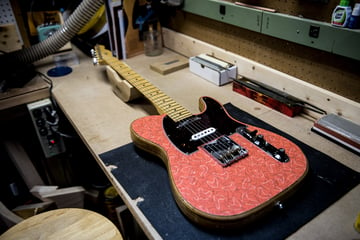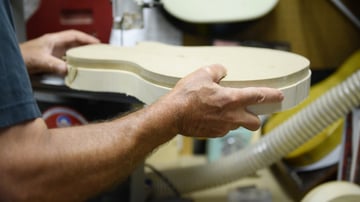 Building guitars (and other musical instruments) is a precise and delicate craft that, at one point, was mainly reserved for highly technical professionals. While those career luthiers and guitar builders certainly still exist, the landscape of the craft is certainly changing. Today, more musicians are turning maker with the help of tools and resources that are become much more widely available thanks to the internet as well as our modern maker culture.
Building guitars (and other musical instruments) is a precise and delicate craft that, at one point, was mainly reserved for highly technical professionals. While those career luthiers and guitar builders certainly still exist, the landscape of the craft is certainly changing. Today, more musicians are turning maker with the help of tools and resources that are become much more widely available thanks to the internet as well as our modern maker culture.
Guitar building today can be a hobby or a career, and if your brand wants to connect with this growing, passionate segment, you'll want to get to know the real makers behind it. In this post, we'll show who today's luthiers and guitar builders are by the demographics and discuss how the Maker Movement opened the door to the guitar making craft.
Luthier and Guitar Builder Demographics
 As a basic definition, a luthier, or guitar builder, is a skilled artisan who makes or repairs stringed instruments. While some of today's luthiers choose an instrument niche, such as acoustic guitars or ukuleles, others like Dave Lackey from our Makers 1-on-1 interview series use the large skill overlap to create a wide variety of different guitars from scratch or using guitar kits. While professional luthiers sometimes work in factories or repair shops, self-employed and hobbyist luthiers build in their own workshops and on their own schedules.
As a basic definition, a luthier, or guitar builder, is a skilled artisan who makes or repairs stringed instruments. While some of today's luthiers choose an instrument niche, such as acoustic guitars or ukuleles, others like Dave Lackey from our Makers 1-on-1 interview series use the large skill overlap to create a wide variety of different guitars from scratch or using guitar kits. While professional luthiers sometimes work in factories or repair shops, self-employed and hobbyist luthiers build in their own workshops and on their own schedules.
It's fairly safe to say that the majority of guitar builders are also musicians themselves. While the motivations for getting started actually building instruments varies person to person, some of the main reasons include a desire for a hands-on hobby related to their interests or to make a custom instrument that suits their own playing style or design taste.
By the numbers, the luthier segment is slowly diversifying as new groups begin to join the craft. In terms of ethnicity, 80% of luthiers in the United States identify as white as of 2019. Following that majority, East Asian and African American luthiers each make up 4% of the community, while other ethnic groups make up smaller percentages.
In terms of gender, 86% of luthiers are male while the remaining 14% are female. However, further statistics show that of all people who are interested in become luthiers, 41% are female. Considering current trends that show how half of new guitarists today are female, the gap in this ratio is likely to decrease in the coming years.
How the Maker Movement Empowers Luthiers
 In general, the Maker Movement, today's cultural movement to support handmade crafts and small businesses as a counter culture to mass production, empowers anyone and everyone to learn a skilled art. Thanks to the demand for handmade goods as well as access to more creative resources than ever, plenty of musicians are making the switch from passive consumers to active makers today. While hobbyist or self-employed luthiers may still purchase guitars from their favorite brands, they also work hard to hone the skills necessary to make their own instruments, too.
In general, the Maker Movement, today's cultural movement to support handmade crafts and small businesses as a counter culture to mass production, empowers anyone and everyone to learn a skilled art. Thanks to the demand for handmade goods as well as access to more creative resources than ever, plenty of musicians are making the switch from passive consumers to active makers today. While hobbyist or self-employed luthiers may still purchase guitars from their favorite brands, they also work hard to hone the skills necessary to make their own instruments, too.
Guitar building requires a wide set of skills that range from woodworking techniques to electronic wiring and management. With woodworking and guitar suppliers to back them up, luthiers have more access than ever to professional-level CNC cutting machines, power tools, guitar hardware, and a wide range of paints and finishes to style their finished instruments. Perhaps the most powerful agent of the Maker Movement is the robust online community of luthiers and guitar builders who connect over social media and forums in order to share support and resources like patterns and advice. As the movement continues to develop and change our culture's attitude toward hands-on crafting, we can expect to see even more growth and creativity from the guitar building segment.




